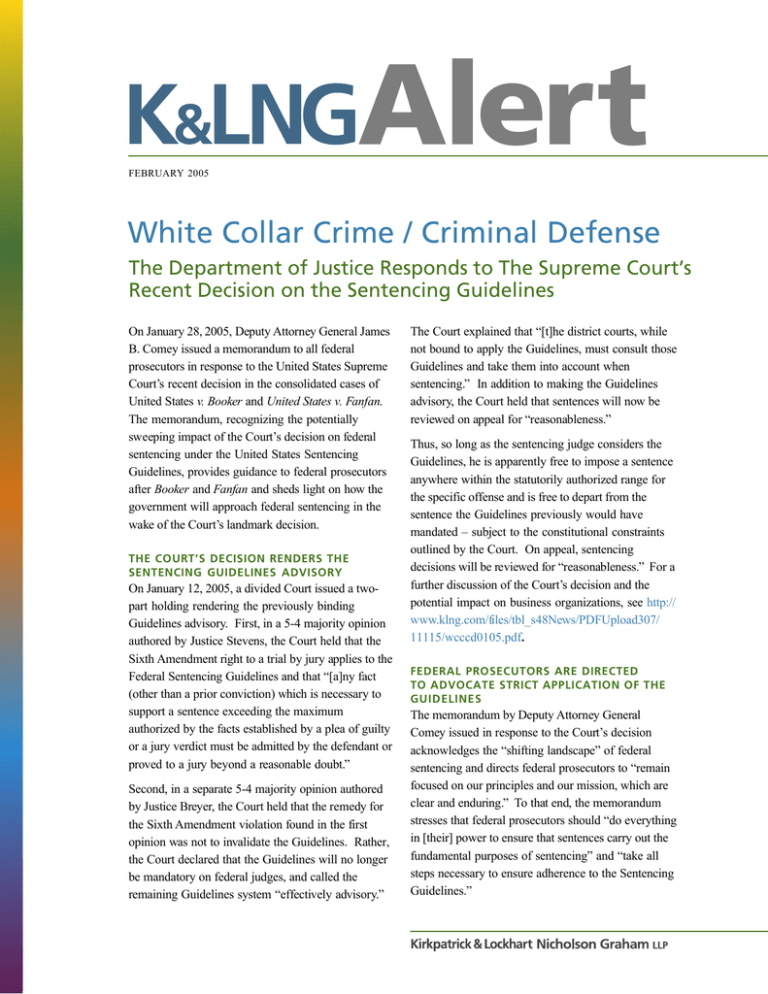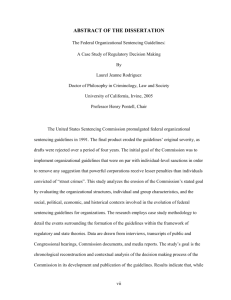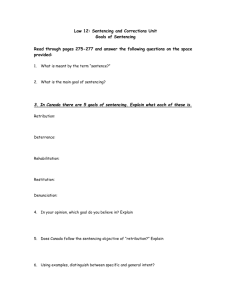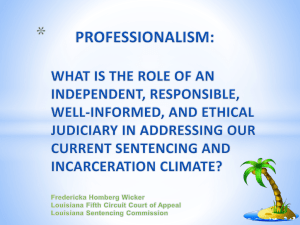
FEBRUARY 2005
White Collar Crime / Criminal Defense
The Department of Justice Responds to The Supreme Court’s
Recent Decision on the Sentencing Guidelines
On January 28, 2005, Deputy Attorney General James
B. Comey issued a memorandum to all federal
prosecutors in response to the United States Supreme
Court’s recent decision in the consolidated cases of
United States v. Booker and United States v. Fanfan.
The memorandum, recognizing the potentially
sweeping impact of the Court’s decision on federal
sentencing under the United States Sentencing
Guidelines, provides guidance to federal prosecutors
after Booker and Fanfan and sheds light on how the
government will approach federal sentencing in the
wake of the Court’s landmark decision.
THE COURT’S DECISION RENDERS THE
SENTENCING GUIDELINES ADVISORY
On January 12, 2005, a divided Court issued a twopart holding rendering the previously binding
Guidelines advisory. First, in a 5-4 majority opinion
authored by Justice Stevens, the Court held that the
Sixth Amendment right to a trial by jury applies to the
Federal Sentencing Guidelines and that “[a]ny fact
(other than a prior conviction) which is necessary to
support a sentence exceeding the maximum
authorized by the facts established by a plea of guilty
or a jury verdict must be admitted by the defendant or
proved to a jury beyond a reasonable doubt.”
Second, in a separate 5-4 majority opinion authored
by Justice Breyer, the Court held that the remedy for
the Sixth Amendment violation found in the first
opinion was not to invalidate the Guidelines. Rather,
the Court declared that the Guidelines will no longer
be mandatory on federal judges, and called the
remaining Guidelines system “effectively advisory.”
The Court explained that “[t]he district courts, while
not bound to apply the Guidelines, must consult those
Guidelines and take them into account when
sentencing.” In addition to making the Guidelines
advisory, the Court held that sentences will now be
reviewed on appeal for “reasonableness.”
Thus, so long as the sentencing judge considers the
Guidelines, he is apparently free to impose a sentence
anywhere within the statutorily authorized range for
the specific offense and is free to depart from the
sentence the Guidelines previously would have
mandated – subject to the constitutional constraints
outlined by the Court. On appeal, sentencing
decisions will be reviewed for “reasonableness.” For a
further discussion of the Court’s decision and the
potential impact on business organizations, see http://
www.klng.com/files/tbl_s48News/PDFUpload307/
11115/wcccd0105.pdf.
FEDERAL PROSECUTORS ARE DIRECTED
TO ADVOCATE STRICT APPLICATION OF THE
GUIDELINES
The memorandum by Deputy Attorney General
Comey issued in response to the Court’s decision
acknowledges the “shifting landscape” of federal
sentencing and directs federal prosecutors to “remain
focused on our principles and our mission, which are
clear and enduring.” To that end, the memorandum
stresses that federal prosecutors should “do everything
in [their] power to ensure that sentences carry out the
fundamental purposes of sentencing” and “take all
steps necessary to ensure adherence to the Sentencing
Guidelines.”
After articulating the Justice Department’s basic
philosophy on federal sentencing, the memorandum
states that the role of prosecutors is “to enforce the law
by bringing appropriate charges and advocating the
consistent application of the Sentencing Guidelines
and mandatory minimums, which reflect the
judgments Congress has made about appropriate
sentences for federal crimes.” Accordingly, the
memorandum provides specific guidance in four
distinct areas to “help [prosecutors] faithfully execute
that role in the wake of Booker.”
First, the memorandum directs federal prosecutors to
consult the Guidelines at the charging stage and to
“continue to charge and pursue the most serious
readily provable offenses,” e.g., offenses “that would
generate the most substantial sentence pursuant to (1)
the Guidelines; (2) one or more applicable mandatory
minimums; and/or (3) a consecutive sentence required
by statute.” According to the memorandum, the
purpose of charging defendants with offenses that will
carry the most significant penalty is to “ensure that
sentences reflect real offense conduct.”
Second, the memorandum directs federal prosecutors
to “actively seek sentences within the range
established by the Sentencing Guidelines in all but
extraordinary cases.” To that end, federal prosecutors
“must obtain supervisory authorization to recommend
or stipulate to a sentence outside the appropriate
Guidelines range or to refrain from objecting to a
defendant’s request for such a sentence.”
Third, federal prosecutors are instructed to “preserve
the ability of the United States to appeal
‘unreasonable’ sentences.” Thus, whenever a sentence
imposed is below what the United States believes is
the appropriate Guidelines range, “federal prosecutors
must oppose the sentence and ensure that the record is
sufficiently developed to place the United States in
the best position possible on appeal.” When a
sentence “fails to reflect the purposes of sentencing,”
the prosecutor should seek approval to file an appeal
from the Solicitor General.
Fourth, while the Justice Department has not proposed
or endorsed any particular action by Congress or the
Sentencing Commission in response to Booker, the
memorandum instructs federal prosecutors to continue
following “[t]he existing requirements for reporting
2 FEBRUARY 2005
adverse decisions” in order to “assess the impact” of
the Court’s decision.
Ostensibly to aid in that assessment, the memorandum
includes a “Booker Sentencing Report Form” that is
to be used if a sentencing court (i) imposes a sentence
outside of the Guidelines range (unless on request of
the government); (ii) refuses to calculate a Guidelines
range; or (iii) if a motion is made by the government
for a departure based on substantial assistance to
authorities or pursuant to an early disposition
program, but the court sentences below the
government’s recommended range. This form
supplements already existing reporting requirements
for adverse sentencing decisions pursuant to the U.S.
Attorney’s Manual § 9-2.170(B), which requires
federal prosecutors to report adverse sentencing
decisions for a variety of reasons, including but not
limited to departures based on criminal history,
departures based on “discouraged” or “unmentioned”
factors, and departures on remand.
CONCLUSION
The memorandum issued by Deputy Attorney General
Comey clearly indicates that the Justice Department is
concerned about the impact of the Court’s decision on
federal sentencing, noting that these are “difficult
circumstances.” The memorandum concludes with
encouragement for federal prosecutors, stating that
“[y]our ability and dedication will get the job done in
these challenging times.”
In practice, the memorandum instructs federal
prosecutors to pursue an application of the Guidelines
as if nothing has changed. The basic directive of the
memorandum is that federal prosecutors must
continue to advocate a strict application of the
Guidelines and report all cases where the district court
does not impose the sentence called for by the
Guidelines.
Whether the government’s approach will have the
desired impact of maintaining a consistent application
of the Guidelines in federal sentencing remains to be
seen. To be sure, district court judges remain free to
follow the Guidelines after Booker exactly as they
would have before Booker – provided that the facts
necessary to support the sentence were admitted by
the defendant or proved to the jury beyond a
reasonable doubt. It is likely that a number of judges
KIRKPATRICK & LOCKHART NICHOLSON GRAHAM LLP
will do just that – because the Guidelines have been
the foundation of federal sentencing for twenty years.
However, judges are also apparently free to consult
and reject the Guidelines and impose different
sentences within the statutorily authorized range,
subject to appellate review for “reasonableness.”
While the government will undoubtedly advocate
against that approach, the hands of the sentencing
judge are no longer tied to the extent they were under
the mandatory Guidelines regime.
serious offenses under the Guidelines when making
charging decisions and will attempt, through appeals
if necessary, to maintain the system of federal
sentencing under the Guidelines exactly as it existed
before the Court handed down its decision in Booker
and Fanfan. How federal district and appellate courts
will react to this stance by the government remains to
be seen.
Mark A. Rush
Corporations and individuals facing federal
prosecution as well as the lawyers who represent them
must be aware that the government will continue to
aggressively advocate for a strict application of the
Guidelines. Federal prosecutors will pursue the most
mrush@klng.com
412.355.8333
Andrew R. Stanton
astanton@klng.com
412.355.6583
If you have questions or would like more information about K&LNG’s White Collar/Criminal Defense practice,
please contact one of our White Collar/Criminal Defense lawyers listed below:
Boston
Dallas
Michael DeMarco
Jacqueline R. Peterson
mdemarco@klng.com
jacqueline.peterson@klng.com
617.951.9111
214.939.4926
Los Angeles
Miami
New York
Richard P. Crane, Jr.
Beatrice A. Butchko
Eugene R. Licker
William O. Purcell
Mark A. Rush
Dick Thornburgh
Stephen W. Grafman
Barry M. Hartman
David Kwon
rcrane@klng.com
bbutchko@klng.com
elicker@klng.com
wpurcell@klng.com
mrush@klng.com
dthornburgh@klng.com
sgrafman@klng.com
bhartman@klng.com
dkwon@klng.com
310.552.5089
305.539.3371
212.536.3916
212.536.3922
412.355.8333
202.778.9080
202.778.9057
202.778.9338
973.848.4025
Pittsburgh
Washington D.C.
Newark
www
w.. k l n g . c o m
BOSTON
■
DALLAS
■
HARRISBURG
■
LONDON
■
LOS ANGELES
■
MIAMI NEWARK
■
■
NEW YORK PITTSBURGH
■
■
SAN FRANCISCO
■
WASHINGTON
Kirkpatrick & Lockhart Nicholson Graham is a combination of two limited liability partnerships, each named Kirkpatrick & Lockhart Nicholson Graham LLP, one established in Delaware, USA,
and one incorporated in England.
This publication/newsletter is for informational purposes and does not contain or convey legal advice. The information herein should not be used or relied upon in regard to any particular facts
or circumstances without first consulting a lawyer.
Unless otherwise indicated, the lawyers are not certified by the Texas Board of Legal Specialization.
Data Protection Act 1998 - We mat contact you from time to time with information on Kirkpatrick & Lockhart Nicholson Graham LLP seminars and with our regular newsletters, which may be of
interest to you. We will not provide your details to any third parties. Please e-mail cgregory@klng.com if you would prefer not to receive this information.
© 2005 KIRKPATRICK & LOCKHART NICHOLSON GRAHAM LLP. ALL RIGHTS RESERVED.





